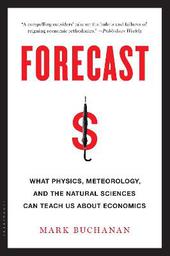
|
Forecast: What Physics, Meteorology, and the Natural Sciences Can Teach Us About Economics
Paperback / softback
Main Details
| Title |
Forecast: What Physics, Meteorology, and the Natural Sciences Can Teach Us About Economics
|
| Authors and Contributors |
By (author) Mark Buchanan
|
| Physical Properties |
| Format:Paperback / softback | | Pages:272 | | Dimensions(mm): Height 210,Width 140 |
|
| Category/Genre | Economics |
|---|
| ISBN/Barcode |
9781608198535
|
| Classifications | Dewey:330.0112 |
|---|
| Audience | |
|---|
| Illustrations |
B&W illustrations throughout
|
|
Publishing Details |
| Publisher |
Bloomsbury Publishing Plc
|
| Imprint |
Bloomsbury Press
|
| Publication Date |
14 August 2014 |
| Publication Country |
United States
|
Description
Positive feedback-when A produces B, which in turn produces even more A-drives not only abrupt climate changes, but also the most important and disruptive events in economics and finance, from asset bubbles to debt crises, bank runs, even corporate corruption. But economists, with few exceptions, have ignored this reality for fifty years, holding onto the unreasonable belief in the wisdom of the market. It's past time to be asking how do markets really work? Can we replace economic magical thinking with a better means of predicting what the financial future holds, in order to prepare for, or even avoid the next extreme economic event? In Forecast, physicist and acclaimed science writer Mark Buchanan answers these questions and more in building a new model for economics, one that accepts that markets act much like the weather does. While centuries of classical financial thought has trained us to understand "the market" as something that always returns to equilibrium, economies work more like our atmosphere-a loose surface balance riding on a deeper torrent of fluctuation. Market instability is as natural-and dangerous-as a prairie twister. With Buchanan's help, we can better govern the markets and weather their storms.
Author Biography
Mark Buchanan is a physicist and science writer. He is the author of three previous books, Ubiquity, Nexus, and The Social Atom, and has been an editor of the science journal Nature as well as New Scientist. His articles have appeared in Science, Wired, the New York Times, the Independent, and the Harvard Business Review. He currently writes columns for Bloomberg View, as well as for Nature Physics. He lives in Dorset, England, with his wife and two dogs.
ReviewsThe 2008 crash created not just a crisis in the economy, but also a crisis in economic thinking. Ideas of market stability and efficiency lost their value faster than a sub-prime mortgage. In this compelling and lively account, Mark Buchanan tells the story of the new ideas that are revolutionizing the field. We may not be able to perfectly forecast the economic weather, but we can be better prepared for storms to come. Eric Beinhocker, Executive Director of the Institute for New Economic Thinking at Oxford University and author of The Origin of Wealth The author's stimulating deconstruction of contemporary economic theory parallels a treatment of major positive developments in physical sciences and pays due respect to the functions of government and law. Kirkus Reviews
|